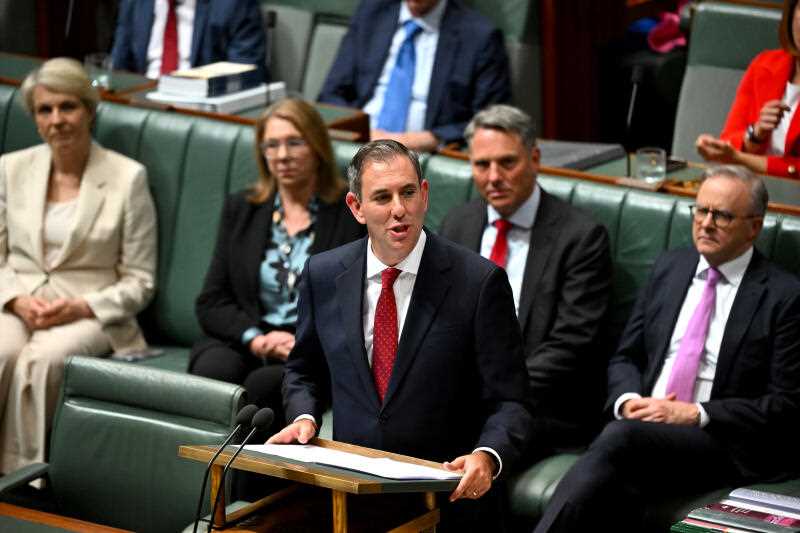Federal Treasurer Jim Chalmers delivers his third Budget to Parliament in Canberra on Tuesday.
By Dominic Giannini and Andrew Brown
Every household will receive an energy rebate and there will be an increase in commonwealth rent assistance in the federal budget as the treasurer promises to help struggling Australians without making inflation worse.
Jim Chalmers had promised more cost-of-living relief for Australians on top of already announced changes to tax cuts ahead of his third budget on Tuesday.
The budget would put downward pressure on inflation to ensure Australians aren’t hurt in the long run if interest rates are hiked and the cost of goods go up, he said.
“The cost-of-living relief in this budget will be substantial”, Treasurer Jim Chalmers says. (Dominic Giannini)
The budget will also be Dr Chalmer’s second back-to-back surplus, with the books $9.3 billion in the black for the 2023/24 financial year.
It’s the first time the country’s finances will be in the black for consecutive years for almost two decades and marks a $10.5 billion improvement on forecasts made in December’s mid-year update which showed a deficit of $1.1 billion.
“We’ll do that by showing spending restraint … and also by making sure we design our cost of living so it’s part of the solution to this inflation challenge rather than part of the problem,” he told reporters in Canberra on Tuesday.
The biggest driver of the second surplus was a strong labour market as opposed to purely increased commodity prices, Dr Chalmers said.
Banking all the added revenue was a responsible decision to not add to inflation, he said.
While the budget is expected to return to the red in the coming years, debt would peak lower than previously forecast after the government banked the extra revenue, Finance Minister Katy Gallagher said.
“That’s important because we’re paying less on our interest,” she told ABC TV.
But the opposition criticised the government for failing to tame inflation in its first two budgets.
“The cost-of-living crisis continues to rage,” shadow treasurer Angus Taylor told reporters in Canberra.
Despite two surpluses, the government needed to focus on a better structure for the budget rather than spruiking the extra money from windfalls, Mr Taylor said.
“It needs to set us up for longer-term growth, which is small business-private sector driven, not driven by the government.”
Mr Taylor pointed to $45 billion of spending the coalition opposed, including the National Reconstruction Fund, a housing fund and advertising for the tax cuts.
“This is not what you do to beat a cost of living crisis,” he said.
But state budgets handing out more cash had also contributed to inflation, economist Chris Richardson said.
“The bottom line is they give families more wriggle room to spend it and they’re going to spend it and that poses some risks around inflation,” he said, pointing to the Queensland, Victorian and West Australian budgets.
He also didn’t believe the treasurer’s assertion that the budget wouldn’t be inflationary, saying tax cuts flowing to all Australians “is something that will keep inflation going”.
The budget didn’t go far enough in assisting struggling Australians, Greens treasury spokesman Nick McKim said.
The budget will be more than $200 billion better off over the six years to 2027/28, compared to forecasts made before the last federal election, budget papers show.
Inflation is also set to drop to 2.75 per cent by December, a year earlier than the Reserve Bank predicted it would fall back within its target band of two-to-three per cent.






